Vivaldi Zsuzsa Barlay, Ferenc Szekeres, Budapest Madrigal Choir, Hungarian State Orchestra - Juditha Triumphans Excerpts
Album: Juditha Triumphans Excerpts
Table of Contents
Download
Filename: vivaldi-zsuzsa-barlay-ferenc-szekeres-budapest-madrigal-choir.rar- MP3 size: 50.4 mb
- FLAC size: 483 mb
Tracks
| Track | Duration | Preview |
|---|---|---|
| No. 27 Aria | ||
| No. 10 Aria | ||
| No. 1 Chorus | ||
| No. 3 Aria | ||
| No. 9 Aria | ||
| No. 15 Aria | ||
| No. 5 Aria | ||
| No. 24 Aria | ||
| No. 16 Aria | ||
| No. 19 Chorus | ||
| No. 30 Chorus | ||
| No. 8 Aria | ||
| Juditha Triumphans Oratorio RV. 644 | ||
| No. 11 Aria |
Images
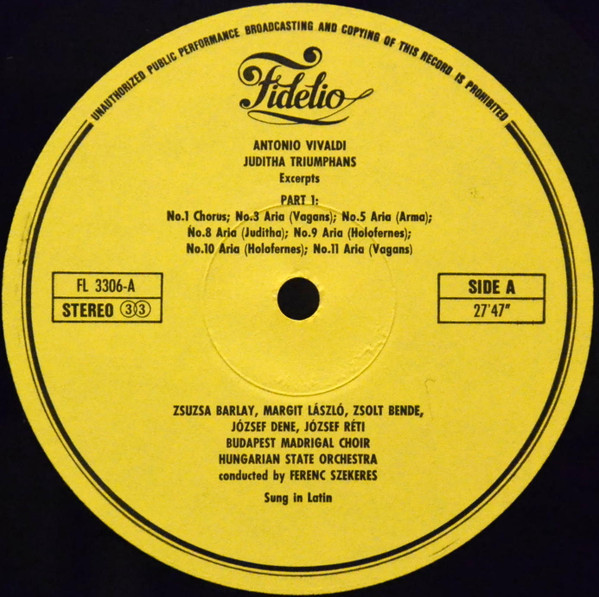
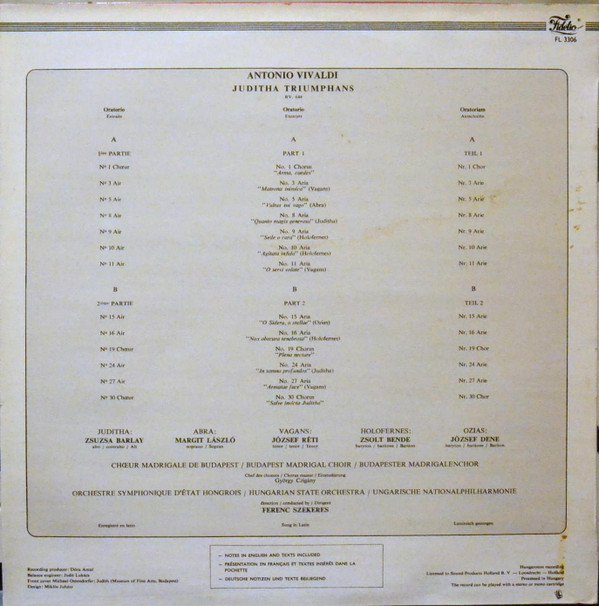
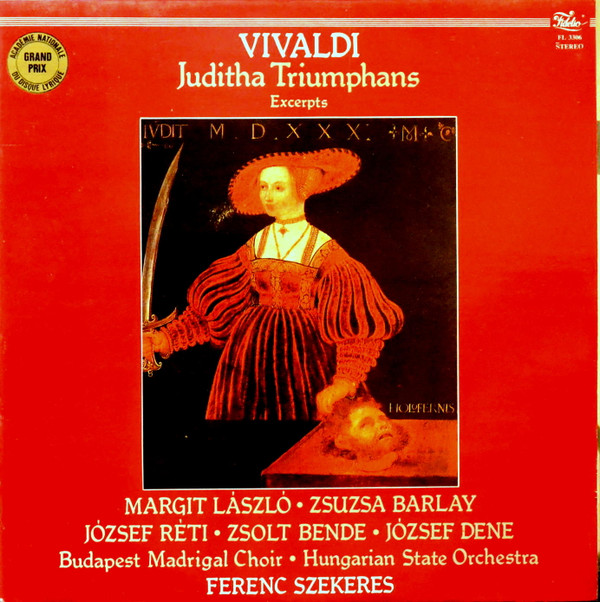
Catalog Numbers
FL 3306Labels
FidelioListen online
- kuunnella verkossa
- online luisteren
- ascolta in linea
- ouvir online
- online anhören
- lyssna på nätet
- lytte på nettet
- escuchar en línea
- écouter en ligne
Formats
- Vinyl
- LP
Companies
| Role | Company |
|---|---|
| Recorded By | Hungaroton |
Credits
| Role | Credit |
|---|---|
| Alto Vocals | Zsuzsa Barlay |
| Baritone Vocals | Bende Zsolt, József Dene |
| Choir | Budapest Madrigal Choir |
| Composed By | Antonio Vivaldi |
| Conductor | Ferenc Szekeres |
| Orchestra | Hungarian State Orchestra |
| Soprano Vocals | Margit László |
| Tenor Vocals | József Réti |
About Vivaldi Zsuzsa Barlay, Ferenc Szekeres, Budapest Madrigal Choir, Hungarian State Orchestra
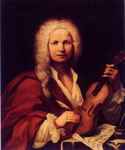
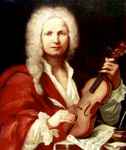
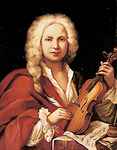
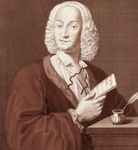
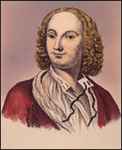
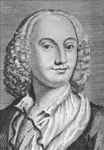
Italian Baroque composer, virtuoso violinist, teacher and cleric.
Born March 4, 1678, Sestiere di San Marco, Repùblica Vèneta, Italy. Died July 28, 1741, Kärntnertor, Vienna, Austria.
He is recognized as one of the greatest Baroque composers, and his influence during his lifetime was widespread across Europe. He is known mainly for composing many instrumental concertos, for the violin and a variety of other instruments, as well as sacred choral works and more than forty operas. His best-known work is a series of violin concertos known as "The Four Seasons".
Vivaldi's career as a violinist and composer was almost inevitable. His father was Giovanni Battista Vivaldi, a founder of the Sovvegno dei musicisti di Santa Cecilia, an early musician's collective, who's President was the Baroque operatic composer and tutor Giovanni Legrenzi. As a youth, touring and performing around Venice in accompaniment on the violin with his father, he is likely to have been influenced by Legrenzi who had become maestro di cappella at St. Mark's Basilica in 1681.
A redhead like his father, Vivaldi took up the course of attaining a priesthood in 1693 and became ordained in 1703, referred to by those around him as "Il Prete Rosso" because of his red hair. By late 1703 he was unable to maintain his practice in the priesthood due to ill health and sought employment as a tutor of music, retaining his reverential title.
By 1704 he worked as maestro of violin in Venice at the orphanage of the Devout Hospital of Mercy, an institution known as Conservatorio dell'Ospedale della Pietà, providing shelter to orphaned and abandoned children. Here the boys were taught a trade, whilst the girls were given a musical education. The talented were selected for the conservatory's orchestra & choir, which gained high regard both in Venice and abroad. Vivaldi used this period to write the majority of his concertos, cantatas and arias.
The institute provided an ideal environment for Vivaldi to explore the avenues of the ritornello form. The first of his works were published in 1705, a second Opus in 1709. His third Opus was published in Amsterdam in 1711 and gained him enthusiastic attention throughout Europe followed by a fourth Opus in 1714. He became Musical Director of the Pietà's institute in 1716 and was contracted to provide two concerti a month for the orchestra. Papers from the Pietà's history show that Vivaldi produced 140 concerti between 1723 and 1733.
In 1714 Vivaldi took on the role of impresario of the theater Sant'Angelo in Venice, presenting "Orlando finto pazzo
Real Name
- Antonio Lucio Vivaldi
Name Vars
- A Vivaldi
- A, Vivaldi
- A. Vivaldi
- A. Vivaldi (1678-1741)
- A. Vivaldis
- A. Vivaldy
- A. Vivardi
- A. vivaldi
- A.L.ô£ÐëÇ£
- A.Vivaldi
- A.ô£ô¡ëÇ£
- A; Vivaldi
- Allegro
- Antinio Vivaldi
- Anton Vivaldi
- Antoni Vivaldi
- Antonio
- Antonio (Lucio) Vivaldi
- Antonio L. Vivaldi
- Antonio Licio Vivaldi
- Antonio Lucio Vivaldi
- Antonio Vivaldi (?)
- Antonio Vivaldi, 1678-1741
- Antonio Vivaldi?
- António Vivaldi
- D. Antonio Vivaldi
- Don Antonio Vivaldi
- G. Verdi
- VIVALDI
- VIvaldi
- Vavaldi
- Viva Vivaldi
- Vivald
- Vivaldi
- Vivaldi A.
- Vivaldi Antonio
- Vivaldi Antonio Lucio
- Vivaldi,
- Vivaldi, Antonio
- Vivaldis
- Vivaldy
- Vivladi
- Βιβάλντι
- А. Вивалди
- А. Вивальди
- А. Вівальді
- А.Вивальди
- А.Вівальді
- Антонио Вивалди
- Антонио Вивальди
- Антонио Вивальди (1678-1741)
- Антоніо Вівальді
- Вивалди
- Вивальди
- Вивальди А.
- Вивальди Антонио
- ویوالدی
- ¢óÈ˪ûô£ô¡ëÇ£
- ÓÐëÇ£
- ô£ÐëÇ£
- ô£ô¡ëÆ£
- ô£ô¡ëÇ£
- ไజԔ
